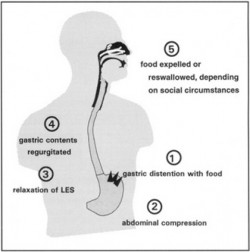Recognizing Rumination Syndrome Symptoms
In Latin, rumination means “to chew the cud.” In the same vein, someone suffering from rumination syndrome re-chews regurgitated, partially digested food or spits it out, according to the University of Nebraska Medical Center. This definition can go a long way towards helping a person recognize rumination syndrome symptoms.
Originally believed to affect mainly children and mentally disabled individuals, rumination syndrome symptoms can affect most any age group regardless of mental capacity. As bringing up food on a regular basis can easily be construed as some form of vomiting disorder, rumination syndrome symptoms are often misdiagnosed.
For the most part, people affected by this condition have little to no control over it since the regurgitation aspect results from a physical reflex response. In actuality, rumination syndrome symptoms have both physical and behavioral causes.
The Rumination Process

Rumination syndrome begins in the intestines.
Rumination syndrome symptoms appear to be gastrointestinal in origin, which accounts for the difficulty in recognizing this condition. While psychological factors can aggravate a gastrointestinal condition, a gastrointestinal-based problem still centers around a physical cause. For this reason, rumination syndrome may be misdiagnosed as a gastrointestinal disorder.
Under normal conditions, food is first chewed in the mouth and then further digested by stomach contractions. Stomach contractions rely on the muscles in the diaphragm to contract and expand. With rumination syndrome, diaphragm muscles rather enter a relaxed state so the food in the stomach remains undigested.
Much like the body’s belching reflex, undigested food materials rise back up the esophagus and reenter the mouth at which point a person either rechews the food or spits it out. In effect, the body’s diaphragm muscles have “learned” to relax during and after a meal. Rumination syndrome symptoms result from this learned behavior.
Rumination Syndrome Symptoms
To date, most cases of rumination syndrome have been diagnosed in children and teenagers, though adults can develop the disorder as well. Symptoms of rumination syndrome include –
- Painless regurgitation
- Food comes back up in an undigested state
- Food is re-chewed and re-swallowed or spit out
- No feelings of nausea before, during or after regurgitation
- Regurgitation happens within 30 minutes to an hour after eating
- Standard treatment interventions for reflux-related conditions prove ineffective
- Symptoms persist for a month or longer
Rumination syndrome can develop in infants less than eight months old as well as in children and teens.
Rumination Syndrome in Adults
Regurgitation in any form is considered vomiting for the most part. This close association with vomiting accounts for why rumination syndrome symptoms can be easily misdiagnosed. For this reason, more and more adults have been diagnosed with rumination syndrome as healthcare providers gain a better understanding of this condition.
According to the National Center for Biotechnology Information, adults were more likely to be diagnosed with acid-reflux disorder or gastroparesis (weak stomach muscles) conditions than rumination syndrome, especially in cases where a psychiatric disorder exists.
When left undiagnosed or misdiagnosed, people suffering from rumination syndrome can develop a range of health problems, some of which include –
- Malnutrition
- Dental problems
- Weight loss
- Electrolyte imbalances
While physicians ultimately make the final diagnosis, being able to recognize symptoms of rumination symptoms can go a long way towards getting needed treatment in a timely manner.





